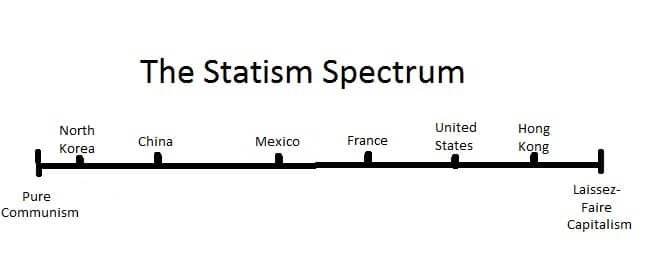

Traders on the New York Stock Exchange (NYSE) with Barclays, etc. (Photo: Reuters)
The communist economic system was a total disaster, but it wasn’t because of excessive taxation. Communist countries generally didn’t even have tax systems. The real problem was that communism was based on central planning, which is the notion that supposedly wise bureaucrats and politicians could scientifically determine the allocation of resources.
But it turns out that even well-meaning commissars did a terrible job. There was massive inefficiency and widespread shortages. Simply stated, notwithstanding the delusions of some left-wing economists (see postscript of this column), the system was an economic catastrophe.
Why? Because there were no market-based prices.
And, as explained in this video from Learn Liberty, market-based prices are like an economy’s central nervous system, sending signals that enable the efficient and productive allocation of resources in ways that benefit consumers and maximize prosperity.
[brid video=”19496″ player=”1929″ title=”What If There Were No Prices Railroad Thought Experiment Learn Liberty”]
And just in case it’s not obvious from the video, a price system can’t be centrally planned. Or, to be more precise, you won’t get good results if central planners are in charge.
Now let’s look at a bunch of economic policy questions that seem unrelated.
What’s the underlying reason why minimum wages are bad? We know they lead to bad effects such as higher unemployment, particularly for vulnerable populations, but how do these bad effects occur?
Why is it bad to have export subsidies such as the Export-Import Bank? It’s easy to understand the negative effects, such as corrupt cronyism, but what’s the underlying economic concern?
Or what’s the real reason why third-party payer is misguided? And why should people be concerned about high marginal tax rates or double taxation? Or Obamacare subsidies? Or unemployment insurance?
These questions involve lots of different issues, so at first glance there’s no common theme.
But that’s not true. In every single case, bad effects occur because politicians are distorting the workings of the price system with preferences and penalties.
And that’s today’s message. We generally don’t have politicians urging the kind of comprehensive central planning found is genuinely socialist regimes. Not even Bernie Sanders. But we do have politicians who advocate policies that undermine the price system on an ad-hoc basis.
Every tax, every regulation, every subsidy, and every handout is going to distort incentives for some people. And the cumulative effect of all these interventions is like a cancer that eats away at prosperity.
The good news is that we don’t have nearly as many of these bad policies as places such as France and Mexico. But the bad news is that we have more of these policies than Hong Kong and Singapore. The bottom line is that America could be much richer with less intervention. But that would require less ad-hoc interventionism.

P.S. There’s a bit of economic wisdom in these jokes that use two cows to explain economic systems.
P.P.S. Here are two other videos on the price system, both of which help explain why only a decentralized market system can allocate resources in ways that benefit consumers.
P.P.P.S. A real-world example of the price system helped bring about the collapse of communism.


